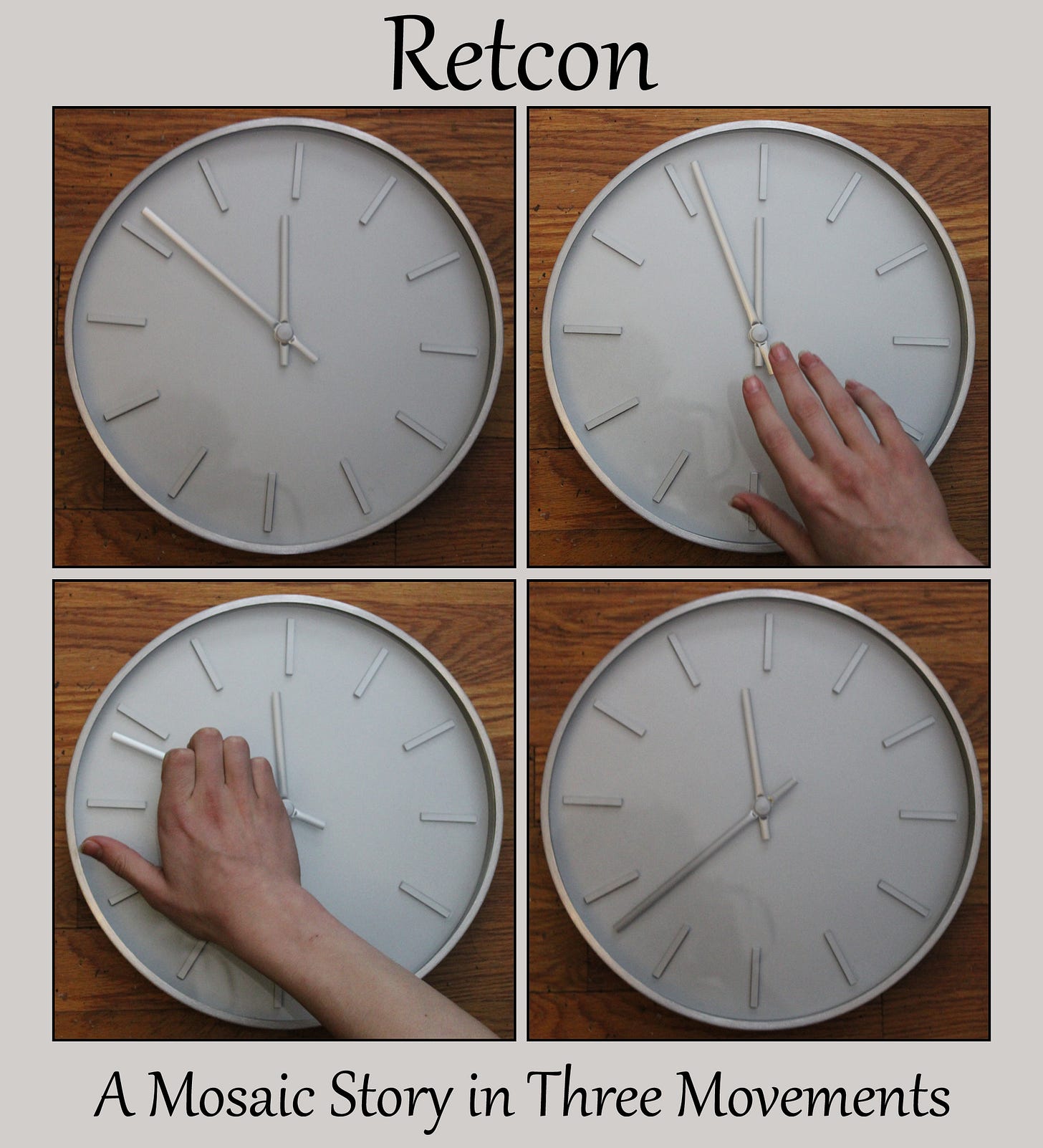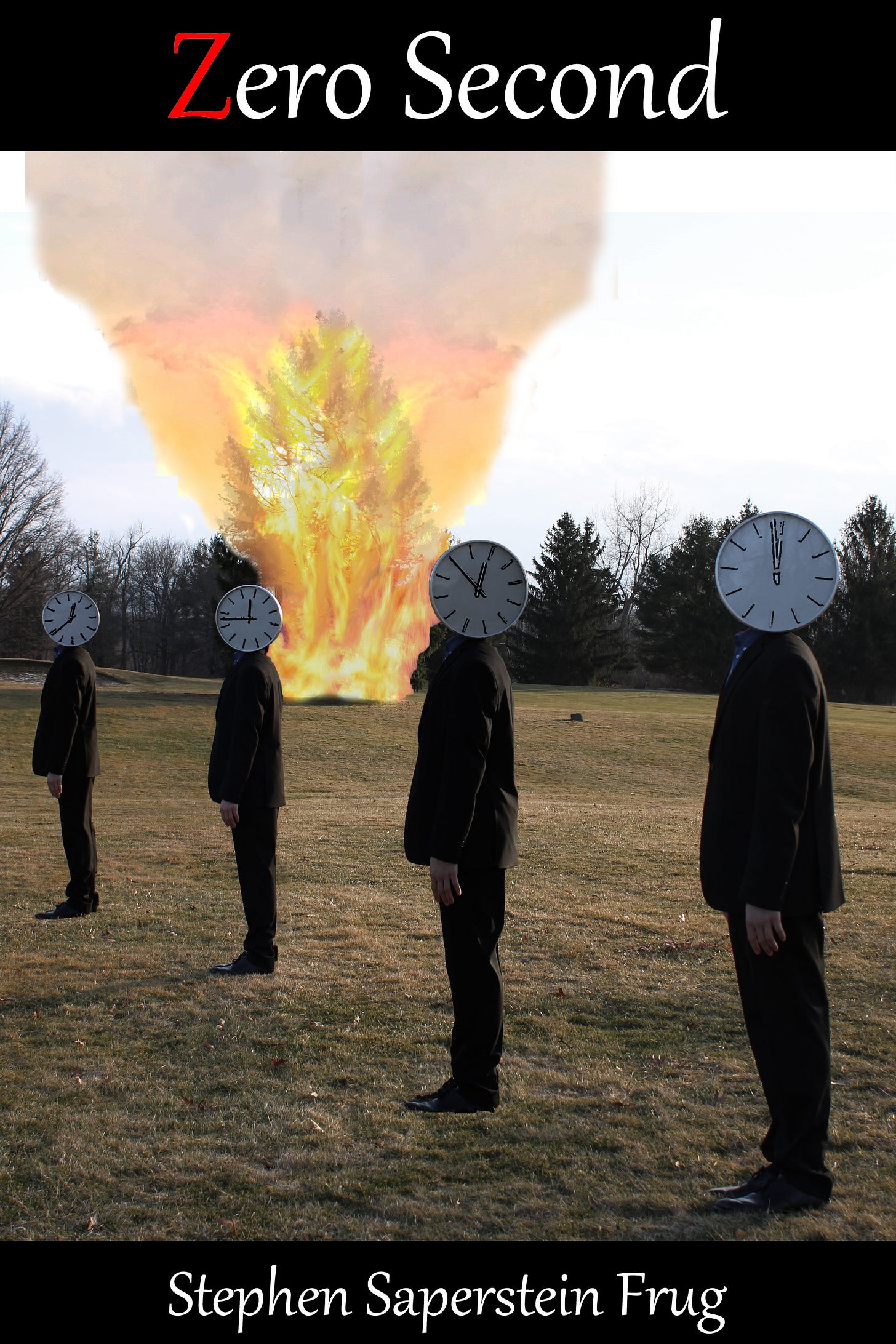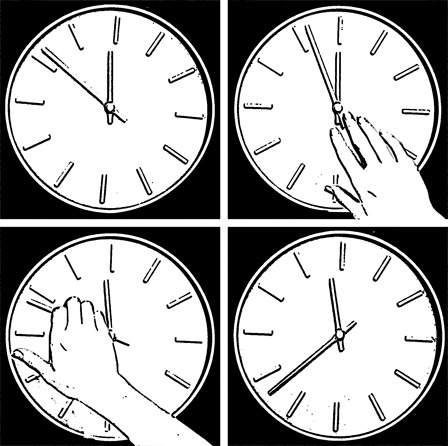This is cross-posted from Attempts's new home on substack. If you are reading this, you should go subscribe to the substack! New updates will be mostly there, and new essays & other substantive material will be exclusively there. We now return you to your regular post, already in progress:
I am debuting a new project—a big project—one I've been working on for a few years and which I have been gathering ideas for for longer than that. And I am hoping that you will give the first installment a try.
What is this project? you ask. Why, say I, I am glad you asked that.1
Well, you remember that last week I put forward the term "mosaic stories" to refer to the general form of stories where small, to-some-degree self-contained stories make up a larger one? It so so happens, in an astonishing coincidence, that that's precisely the form of the story I've been working on.
The story's name is Retcon.
It will be a large story composed of twenty-seven smaller ones, divided into three sections, or "movements" as I've decided to call them.2 The smaller stories are (prose) short stories, averaging about 15,000 words each. 3 The stories are going to be released as ebooks (to begin with), although I have plans for print collections too. I am planning to release them on a monthly schedule, with a break between movements, so there will be one a month for nine months, and then a break, and then another movement will begin. 4
And the first one is available now. It's called "Zero Second"
So how can I read this story?
You can buy the ebook! It’s only $0.99.5
As for where to buy it, there are lots of options.
• If you want to buy it at Amazon (for Kindle), which is where the majority of ebooks are sold, you can do so at this link.
• Or, if you’d prefer, you can buy it directly from me at my web site.
• Or you could buy it from another ebook vendor; it is available at Smashwords, Barnes & Noble, and Kobo. (So far Apple is being difficult, but I hope to get it up there too before too long).
• Or, if you are willing to commit to the whole narrative (and/or are interested in supporting the series, and this substack in the bargin), you can pre-order the entire series in advance, and I will send them to you as they are released. Note that this offer is exclusive to my web site.6
As I mentioned a few weeks ago, a number of people have offered to support my Substack, for which I was very grateful. Well, if you are interested in supporting this Substack, the best way to do it would be to support me, and the best way to do that would be to support my series. So please: go buy it, and read it!
And, just as important: if you like it, please tell people! Reviews (on Amazon or elsewehere) are really helpful. Even better: tell a friend that you think might like it, and get them to read it.7 Word of mouth is how this series will find its audience, if it does.
So… go! Now! Read! Enjoy!
But what's this story actually about?
A fair question!
I wrote a blurb for the series, which I will share in a moment. But while it fairly represents the whole series, it is something of a spoiler for parts of the first story. So before you read any further, you should go buy or listen to “Zero Second”!
All right, everyone back? Or at least not too spoiler-phobic?
Here’s what the story is about:
In 1951, a pair of scientists at Cornell discovered time-travel. With the specter of the atomic bomb in the immediate background, they decide not to replicate Einstein's mistake of drawing the attention of the political authorities to what might be a weapon. Instead, they decide to set up a clandestine research program to investigate the phenomenon, swearing all those who work on it to keep the secret.
Then, in 1991, a time traveler returns from 2031 with a disturbing message: no traveler and no message has ever come farther back from the moment in time when he left; beyond that instant—dubbed "zero second"—is unreachable. No one knows why. All people know is that something happens on April 4, 2031, to prevent any news of the future.
This is the story of what happens next... if "next" is the right word for a narrative which, in the way of things, is necessarily non-linear.
A Final Repeat of the Basic Point
I hope you will all go read the story; and then go and tell a friend, or three. This is the work of my heart, which I have been pouring myself into, “the heart’s reflections, writ in tears”, as the poet said.8 I hope you’ll give it a try.
Half humorous, half pessimistic, Blending the plain and idealistic— Amusement's yield, the careless fruit Of sleepless nights, light inspirations, Born of my green and withered years... The intellect's cold observations, The heart's reflections, writ in tears. — Pushkin, Eugene Onegin, trans. James Fallen
…although I should say “l’havdil”, the Talmudic term for saying that a
comparison made on one front is not a comparison in other ways (so that
to compare God to a king is not to say that kings are like gods, nor
that God is like a king in living with bread, feeling want,
tasting
grief, and needing friends): I am not comparing myself to Pushkin!
Save that my work, howevermuch lesser than his, is also half humorous,
half pessimistic, and also mixes “the intellect’s cold observations/the
heart’s reflections, writ in tears”.



No comments:
Post a Comment